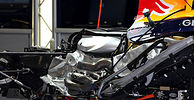Features

Williams review new regs
By Steven De Groote on in SafetyNew engines, new tyre regulations, new qualifying format – the start of the 2006 Formula 1 season was characterised by dramatic changes to the regulations for both the drivers and the teams. Williams takes a look on their effect so far this season.

Safety car procedures
By Steven De Groote on in SafetyWith a new safety car from Mercedes this year, we look at the procedures of a satefy car to guarantee safety on the track at the upcoming GP of Nurburgring.

Bridgestone develops unique tyres for Monaco
By Principessa on in F1With the Monaco Grand Prix little more than a month away, Bridgestone’s technicians are busy developing a tyre specifically for the tricky street circuit.

How Bridgestone's F1 drivers keep fit
By Principessa on in F1The top speed of an F1 car is 6mph slower this year, as a result of the switch from 3-litre V10 engines to 2.4-litre V8s. Yet lap times have remained the same as in 2005 because the cars are faster through the corners than last year.

Safety belts
By Steven De Groote on in SafetyThe cockpit of a Formula 1 car is a safe place to work. It is not only the carbon-fibre monocoque, customised seat, helmet and overalls that help the drivers – the safety belts are key elements that give the driver a sense of security.

Fire extinguisher
By Steven De Groote on in SafetyAs its name suggests, the fire extinguisher fitted to a Formula One car is, in essence, no different to any other, its purpose being to control any fire that may break out on the car.

Car settings for Melbourne
By Steven De Groote on in F1With the first public road circuit of this season coming up, Renault F1 explain some of the special characteristics and its requirements it poses to the cars.

Passive car safety
By Steven De Groote on in F1While performance is the main aim for every designer in F1, the FIA imposes strict regulations to guarantee driver safety. Today's F1 cars are all built around a carbon fibre safety cell which can stand up to enormous crash forces.

Starter motor
By Steven De Groote on in MechanicsWith performance in mind, F1 cars do not carry batteries around the circuit, but must be started with a starter operated by the pitcrew. While there are talks to say goodbye to that in 2008, here's a look at how it is done at the moment.

Drivers face heat at Malaysia
By Steven De Groote on in F1When Formula 1 drivers start sweating even before the start of the race, it's rarely because of the excitement. Mark Webber previews what he believe is the hardest GP of the year, the Malaysian GP at Sepang.






